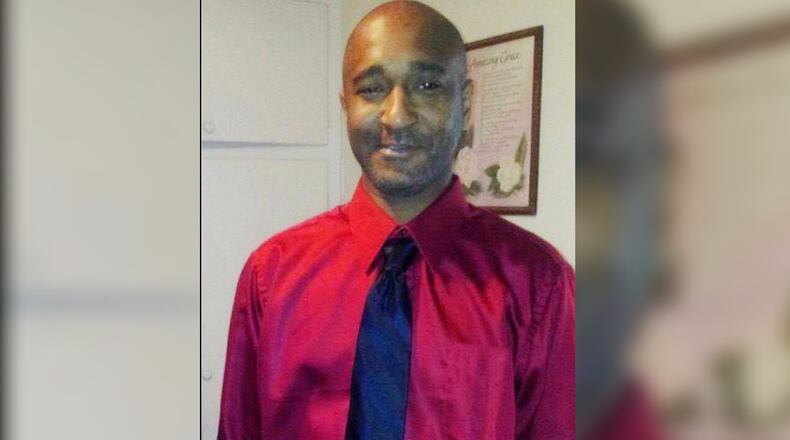The son of a black man who died in police custody in Louisiana after a videotaped altercation that appears to show officers hitting and tasing him two months ago said he feels the family has been denied the truth about what happened.
Tommie McGlothen III spoke to The Associated Press days after local station KSLA broadcast the video and a local coroner revealed details about the April 6 death of Tommie McGlothen Jr.
Officers used Tasers, mace and night sticks to control him, and he suffered multiple injuries from police and an earlier altercation, the coroner said, noting that he spent nearly an hour handcuffed inside a police car before anyone noticed he was unresponsive.
"I honestly believe we were denied the truth," said McGlothen. "At the end of the day, it was murder."
Coroner Todd Thoma described his office's findings in a statement on Tuesday, but didn't release the official autopsy report. He said "excited delirium" and underlying heart disease caused his death, not the injuries, none of which could be considered life-threatening.
He also described his death as possibly preventable, criticizing the fact that he didn't get immediate medical attention. But he concluded McGlothen died of "natural causes," which could complicate legal challenges.
The Associated Press has asked police for comment and public records in the case, with no response.
The video published Monday lasts 4 1/2 minutes, recorded on the cellphone of a bystander who witnessed it from a distance, the station reported. Officers can be seen wrestling with a man on the ground, one of them punching him repeatedly and another appearing to hit him with a baton.
A voice repeatedly says the officers were using a Taser as the man kicked at them. At one point, they raise him to his feet with his hands apparently handcuffed behind him, and he immediately falls or is pushed backward to the ground. Then they get him up and walking, pushing him against a police vehicle, where his head hits the hood.
Credit: Gerald Herbert
Credit: Gerald Herbert
Thoma said McGlothen was left on the back seat for 48 minutes after his struggle with officers before it was discovered that he wasn't breathing. He was declared dead at the hospital the next day, the coroner said.
McGlothen questions how his father — the man who took him fishing and camping and who he constantly relied on for advice — could have died in such a way. He said authorities told the family there had been an altercation with a homeowner but that they weren't told he'd been hit by police or that they used Tasers on him.
He questioned how officers could have left him unattended for so long.
"Someone could have stepped up and said, 'Hey, he needs medical attention.' It shouldn't take 48 to 50 minutes to, to realize that he needs the attention that he needed," he said.
The police have said little publicly about what happened April 5. In a press release Monday, Police Chief Ben Raymond said the police have conducted a thorough investigation, and it's now in the district attorney's hands. He said the four officers have been placed on leave. The district attorney's office declined to comment on the case.
A lawyer for the family, James Carter, said McGlothen suffered from schizophrenia and depression. According to the coroner, McGlothen was "agitated and combative and had fought with a homeowner." The coroner said police arrived after McGlothen blocked a driveway and followed the homeowner inside his house, and that there'd been an incident earlier in the day where he'd tried to get into someone's car.
Credit: Gerald Herbert
Credit: Gerald Herbert
Police reported he'd also been mumbling and showing signs of "paranoia and emotional disturbance," the coroner said. It should have been obvious he needed medical care, said Thoma. His death might possibly have been prevented, the coroner said.
In an interview Friday, Thoma said that delay in getting McGlothen medical attention was a key area of concern. He said the hospital was able to resuscitate him, and he stayed alive for a few hours but eventually died. He said there's no guarantee McGlothen would have survived had he gotten to the hospital immediately but his chances would have been much better with immediate medical attention.
"My question is, why was that not done immediately? Why was he placed in the back of a vehicle? And then that delay happened before he got medical care? I felt like he should have gotten it earlier," he said.
For McGlothen's son, it's clear what needs to happen to the officers.
"They need to be fired for the murder of my father. And they should be prosecuted, prosecuted to the fullest extent of the law," said McGlothen. "He was a great man. And I just want the world to know that he did not deserve it."
In a news release in which he quoted from the American Medical Association, Thoma describes excited delirium as the sudden death of individuals "who are combative and in a highly agitated state" and who have exhibited "agitation, excitability, paranoia, aggression and apparent immunity to pain, often associated with stimulant use and certain psychiatric disorders."
But that determination has been met with skepticism from the McGlothen family. Carter, their lawyer, has called the concept of excited delirium "junk science" that is often used to justify deaths in police custody.
The coroner disputed that, saying it's a widely accepted diagnosis.
About the Author



